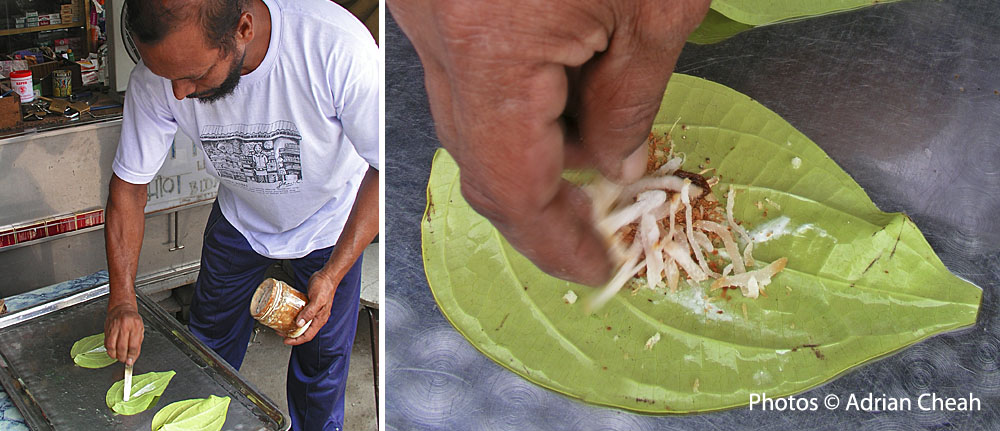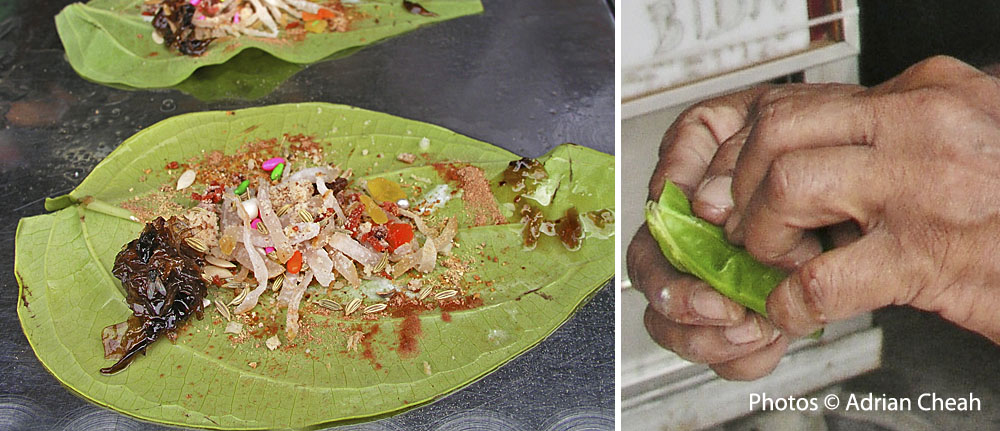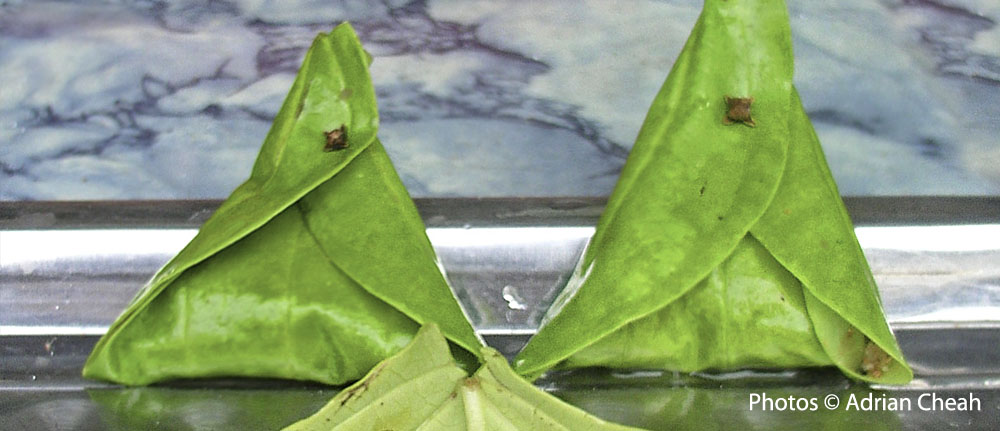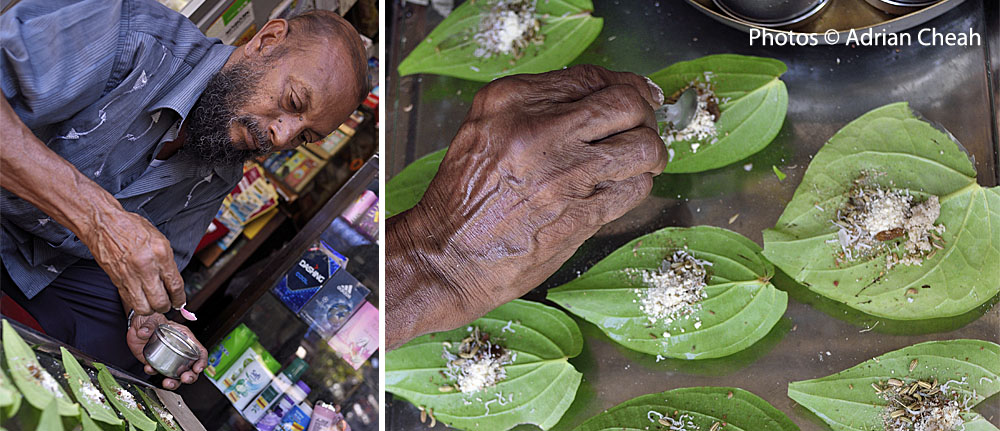Pann – treat of the real thing

Literally translated from Tamil, 'otthu kadai' – that quaint little wooden roadside shop specking the streets of George Town – means "small shop".
The 'otthu kadai' is a pretty interesting emporium – tiny, compact and mottled with a collection of different things. Each of these small convenience shops is a veritable miniature open-air mart selling an exhaustive range of items in an incredibly confined space.

Bananas, plastic nipples, soft drinks, transistor radios, hair shampoo, coconut oil, chewing gum, colour pencils and cigarettes are just a few of the items in the amazing inventory crammed into each stall.
One 'otthu kadai' operator in the heart of George Town's Little India enclave, along the old Market Street artery, has brought a whiff of the real thing in this peculiar trade.
Sitting next to his wares - tomato sauce bottles, aspirins, pocket notebooks, ribbons, razors, et al – Liaquat Ali Khan sells 'paan'.
Also known as 'bidda' in Tamil, the 'paan' is a juicy concoction of titbits inside a carefully folded betel leaf and is immensely popular among Indians.
On the Indian subcontinent, folks everywhere can be seen chewing on the leaf crammed with ingredients, and spitting out the red juice that then builds in the mouth.
Said to be a good laxative and with mildly addictive qualities, the 'paan' is one of those special Indian munchies, best taken after meals.
Liaquat bought the stall business in February 2001 and picked up the skill of making a paan from a Bangladeshi.
"As far as I know, I'm the only one making 'paan' in Penang," he says proudly.

Incidentally, the betel leaf in Malay is called 'Pinang', the very word Penang derives its name from it.
There are several varieties of the 'paan' being made in Liaquat's little stall.
The most basic – and least expensive – comprises mainly local condiments like fennel seeds, ginger flakes, dates, cherry, gambir paste, betel nut, nutmeg and honey. If such a list leaves your taste buds tingling with curiosity, know that these are only the essentials.

The ingredients are whipped together on the betel leaf before it is carefully folded up and pinned neatly with a clove.
The 'paan' variety includes additional stuff like black raisins, with shavings of almond and cashew nut, and a smacking glob of the enchantingly sweet 'gulken' - a beautiful paste of rose petals marinated in honey.
A bigger 'paan' has extra thinly-ground coconut shreds and dates.
Finally, the giant whopping version has all the above ingredients with a dose of the following condiments, all specially brought, I was told, from India: saffron-blended chutney, menthol, a special vegetable and fruit powder assortment called 'Heera Paan Mix', a perfumed mixture of rose leaves called 'Meetha Gulab' and the Rajsagar sweet paste - all from exotic places like Hyderabad, Delhi and Ajmer.
And for those with a penchant for something strong, more stimulating, something that packs a good wallop, there is the 'Jerdha Paan' – betel leaf with tobacco. This version comes with light flavourings like veggie-fruit powder and some mild sweetener, depending on how much extra seasoning you would like.
Liaquat's 'paan' is very uniquely Penang, he insists, because he puts certain ingredients that are not used elsewhere – either in India or any other place in the world.
Liaquat adds coconut flakes and nutmegs to his 'paan'. The sweet, succulent taste of nutmeg is very unique to Penang where the crop is produced in different varieties and large volumes every year.
"I have all kinds of people coming to taste my 'paan'," Liaquat says.
While many of his customers comprise Bangladeshi workers and local Indians plying the Little India area, he also gets tourists wanting to taste his fare.
Tourist guides, especially, love bringing their flocks to his stall where visitors gape with curiosity as Liaquat's nimble fingers whip the many ingredients onto each leaf.
"Once, a visitor from London who was staying in Penang, came to me every day till the day he left," he remembers.
Liaquat used to work as a clerk in a shipping company before dabbling in various petty trades, including selling Islamic books. When he was given the opportunity to buy the 'otthu kadai' stall and manage his own business in the heart of George Town's famous tourist and cultural enclave, he grabbed the chance.
But his work is very much an endangered trade. The number of 'otthu kadai' operators has dwindled over the decades. Youngsters today are not as keen as the earlier generations to operate a roadside stall.

The origin of the 'otthu kadai' is an interesting story in itself. The stall concept was derived from the 'petti kadai' (literally, "box shop") trade in Tamil Nadu, India. The 'petti kadai' was so called because the small portable wooden stall, meant to sell 'paan' and plain betel leaves on the roadside, looked exactly like a box and could be folded up and removed at the end of the day's trade.
Decades after the Indians first brought the 'petti kadai' to Penang in the nineteenth century, the stall gradually evolved. Aspirins, batteries and water pistols were added to a bizarre, growing list of items that were sold along with betel leaves.
In the course of time, however, the betel leaf got left aside, and over the last few decades, there has not been a single stall offering 'paan' or 'bidda'.
But today, Liaquat the 'otthu kadai' operator is a rare breed, bringing back to the roadside stall the product with which it all first began – the 'paan', that charming little juicy concoction inside the old Pinang leaf.
---------------------------------------------------------
Written by Himanshu Bhatt © All rights reserved
Photographed by Adrian Cheah © All rights reserved